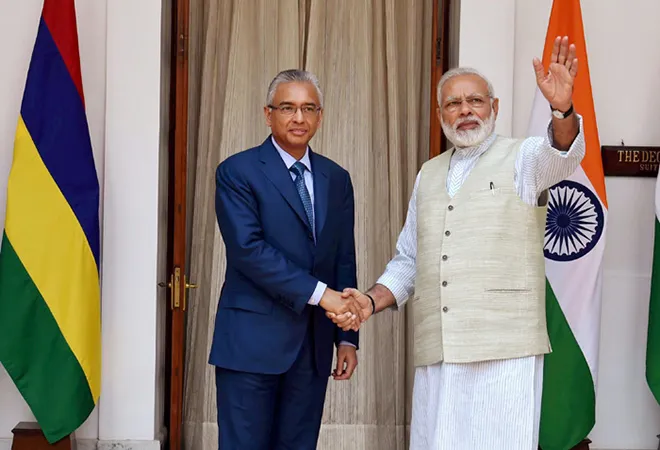
Mauritius is increasingly becoming an integral part of India’s Ocean Diplomacy goals. Though the multi-faceted nature of Mauritius-India relations is often discussed and acknowledged by both countries and reflected in the frequent online conversations that have taken place between its leaders in the recent months, it remains important to ask whether the true potential for cooperation has been realised. The question then arises, in what ways can India better understand Mauritius and its immediate concerns?
An editorial in the Mauritius Times earlier this year, described the new Supreme Court building, constructed with Indian assistance and inaugurated at a virtual event, as “another milestone in the long list of cooperation between our two countries”. It further listed other infrastructure projects that India was associated with, including the Metro Express project, an ENT hospital, and social housing and healthcare projects. More crucially, while recognising cooperation between the two countries, it pointed out that, “the evolving geopolitical landscape of the Indian Ocean (IO) has created new challenges – and opportunities — for the countries in and bordering the IO.” It noted that the Indian Ocean was becoming a pivotal zone of strategic competition, and that this “goes on to explain part of India’s development and security cooperation with smaller Indian Ocean island states”. It then concluded that, “this is the new setting in which we, as a country, will have to view and weigh our relationship with India”.
Mauritius, along with India’s other smaller island neighbours, is acutely aware of its maritime identity and geostrategic value. They especially understand what these mean for their larger neighbour India. Perhaps, as the editorial suggests, “historical and diaspora ties may no longer be enough to engage with island states”. This a point worth considering. While diplomatic rhetoric that focuses on close ties of history, culture and diaspora have leverage in official statements and documents, the reality of the Indian Ocean and its new evolving geopolitics, imply these are no longer sufficient to push ties forward. To take cooperation further, New Delhi needs to consider the real interests and concerns of these island states. One way of effectively doing this is to view Mauritius as it views itself.
Mauritius sees itself primarily as a Small Island Developing State (SIDS). The SIDS were first categorised as a distinct group in 1992 at the Earth Summit, held in Rio de Janeiro, Brazil. In order to understand the wide-ranging challenges faced by Mauritius, it is useful to break-down these components and look closely at what they imply, as each adds its own layer of complexity.
Small size: Small states are vulnerable, politically and economically, in ways that their large counterparts are not. In bilateral and multilateral affairs, the disparity in size creates insecurities in them. They find themselves restricted in their ability to influence the international agenda and the international environment. In order to create stability in their external environment—they focus more on their immediate regional environment rather than the global environment—these smaller states look to ensure that no single big power dominates their immediate neighbourhood. Consequently, Mauritius is paying keen attention to the changing dynamics of the region and the opportunities and challenges that emerge alongside it.
In this regard, balancing power and/or band-wagoning is common among small states. It is important, however, to remember that these are not the only strategies pursued by small states, though admittedly they receive disproportionate attention. Despite their limited capabilities, small states—desirous of maintaining their security and independence—constantly seek creative ways to strengthen their position within the international system. While building coalitions and pursuing alliances with bigger powers, they also look to build networks with similarly-sized states with whom they share common challenges such as the SIDS grouping. Studies have shown that small states are keen to be part of larger regional groupings in order to increase the options available to them.
Therefore, it is important for India to pay attention to this aspect of ‘smallness’ when dealing with islands states such as Mauritius, particularly as New Delhi looks to influence the regional security architecture in the Indian Ocean. What this means specifically is that India should not be too perturbed by the balancing efforts of its smaller neighbours as this is likely to be a repetitively used strategy. Instead, India should pay closer attention to other strategies and assist these states to build larger regional networks that will help maintain their security. To be sure, India’s approach to Mauritius is being increasingly entrenched within a regional framework, as seen with Mission Sagar, India’s initiative to deliver COVID-19-related assistance to countries in the Indian Ocean region. To take this engagement further, India needs to remain proactive in bringing together like-minded partners such as Mauritius, Comoros, Madagascar, Seychelles, Maldives, and Sri Lanka in numerous and overlapping ways.
Islands: Island states essentially have two sets of priorities. Their primary and most urgent concerns relate to the environment. The other concern is management of their Exclusive Economic Zones (EEZ).
Mauritius declared a state of environmental emergency in August of this year due to an oil spill in an area that its government described as “very sensitive.” France, which is often considered a longstanding development partner of Mauritius, responded immediately with teams of equipment being deployed from the nearby Reunion islands, and French President Macron posting on twitter, "When biodiversity is at risk, there is an urgent need for action. France is there. At the side of the Mauritian people." India also responded by sending 30 tonnes of technical equipment to supplement oil containment and salvage operations.
Island states like Mauritius depend heavily on their coastal and marine resources. Environmental crises affect every aspect of Mauritian society and its economic growth due to their impact on tourism, wildlife, water supply, food security, people’s health and actual livelihoods. Capacity building in disaster risk reduction is key for islands states. Further, as Mauritius continues to deal with climate-related risks, especially recurrent flooding, high tides and a decrease in land surface area, as the Permanent Secretary of the Ministry of Social Security, National Solidarity and Sustainable Development made clear, “The technical and financial support from the international community is essential to meet Mauritius’ objectives for a climate resilient and safer country.”
As India is defining its development assistance through a bottom-up approach, focusing on human empowerment and care for the environment—reflected in its recent efforts to provide water and sanitation facilities to the Maldives and emergency ambulance services to Sri Lanka—in Mauritius too, its efforts could go beyond responding to an immediate crisis, and focus on mangrove plantation and reforestation, ocean monitoring and community resilience activities. Looking ahead, India could help coordinate a network of sympathetic island states facing similar challenges such as the Maldives and Seychelles. For capacity building in areas such as flood management, and other natural disasters, India could bring Japan into this network given its knowledge and experience in coping with typhoons, as well as the Indian states of Andhra Pradesh, Odisha, Tamil Nadu, West Bengal and the Union Territory of Puducherry, which are vulnerable to cyclones.
Developing nations: Developing countries, that are also small islands, are often disadvantaged by a narrow base of resources and a small and limited domestic market. This means their production is less diversified and more specialised in certain sectors, though Mauritius has diversified from sugar to textiles and is working towards a service-led economy. The structure of its economy, however, like that of other developing island states, is heavily dependent on foreign trade (its trade to GDP was 93 per cent in 2019), which is exposed to international fluctuations.
The coronavirus pandemic has severely affected and will continue to affect Mauritius’ economy due to massively reduced tourist arrivals as a result of global lockdown measures, and dwindling export demand, particularly in the textile sector. Given that the United States is currently the largest export market for Mauritius, slightly ahead of the UK and South Africa, this dependence on far away markets will mean high energy costs and high transportation costs, and for island states this also spells high infrastructure costs. The Review of Maritime Transport 2020 estimates global maritime trade will fall by 4.1% in 2020. In order to deal with the impact on trade and tourism, along with limited opportunities for its private sector, Mauritius will require special support from the international community. There are several areas in which India can cooperate beginning with taking forward discussions on the Comprehensive Economic Partnership Agreement (CECPA). Taking a broader view of development, other areas of convergence can include increasing the use of renewable energy, assisting in developing smart cities and developing activities related to financial technologies. Here again, India should take a proactive role in creating larger regional networks involving partners like the Seychelles, which have had particular success in building a Blue Economy and innovative financing for sustainable development projects.
In a recent conversation between the Minister for Foreign Affairs of Japan Motegi Toshimitsu, and the PM of Mauritius Pravind Jugnauth, while expressing support for the oil spill efforts, Mr. Motegi conveyed Japan’s intention to support the recovery and development of the Mauritian economy by proposing seminars to promote tourism, trade and investment. India could join in such initiatives.
As Mauritius weighs its future policy options, both foreign policy and economic, amidst changing regional geopolitics, it is useful for India to pay attention to these crucial aspects of the nation’s concerns and its identity as a SIDS. India needs to be a partner to Mauritius in ways that matter to it, so that in the future it will in turn be a partner to India.
The views expressed above belong to the author(s). ORF research and analyses now available on Telegram! Click here to access our curated content — blogs, longforms and interviews.




 PREV
PREV


